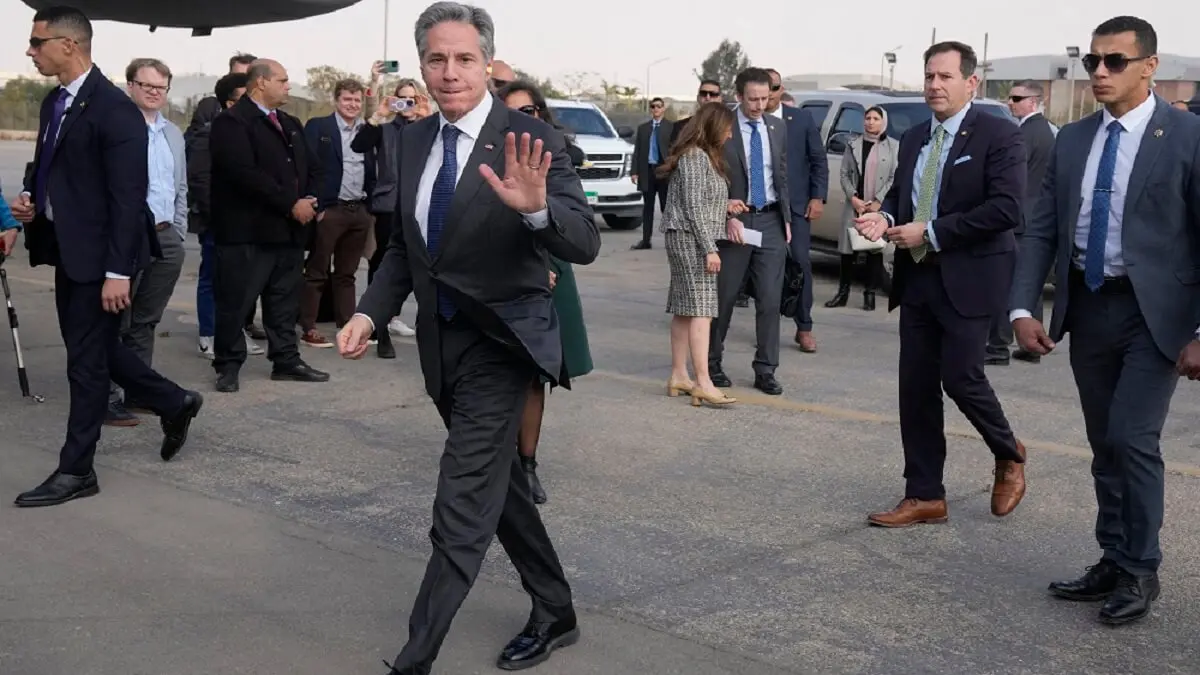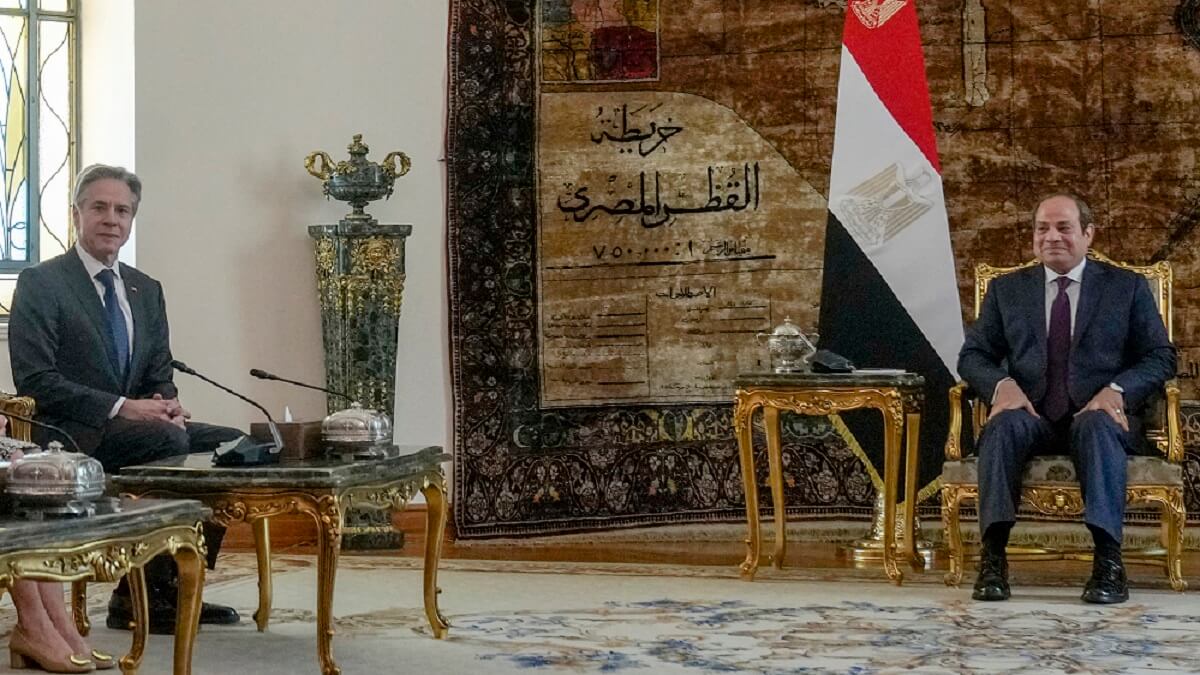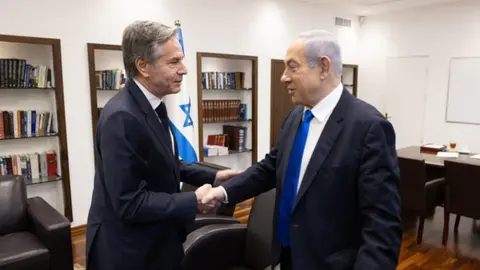Blinken in Middle East, heading into fifth month of Gaza war

US chief diplomat Antony Blinken on Tuesday continued his tour of the Middle East in an attempt to impose a ceasefire between Israel and the Palestinian Hamas movement in the besieged and war-torn Gaza Strip, which has been ravaged by four months of war.
Blinken, who began his fifth regional tour since the war began on 7 October in Saudi Arabia on Monday, arrived in Egypt before stopping in Qatar, two mediating countries alongside Washington, before continuing his trip to Israel and the occupied West Bank.
Meanwhile, shelling and fighting continue in Gaza, where the Hamas Health Ministry has counted 107 dead since the previous day.
In the south of the Palestinian territory, shelling hit Khan Younes overnight and two attacks targeted Rafah, according to an AFP journalist.
The Israeli army said it had engaged in "hand-to-hand fighting" in Khan Younes, a town largely transformed into a field of ruins that Israel says houses leaders of the Palestinian Islamist movement.
The Hamas leader in Gaza, Yahya Sinouar, a native of Khan Younen, is "on the run" and moving "from hideout to hideout", Israeli Defence Minister Yoav Gallant said on Monday.
The army said on Tuesday it was continuing its assault on the city, particularly in the western districts, and that it had killed "dozens of terrorists" the previous day.
The attacks are also targeting the town of Rafah, in the far south of the territory, where more than 1.3 million people who have fled the fighting are crowded in desperate conditions, according to the UN, out of a total population of 2.4 million.

Rafah under threat
The army "leaves us no choice but death or displacement. They have killed children and families, and destroyed our houses, streets and villages," said Riham Sharrab, a 21-year-old woman who fled from Khan Youn to Rafah with her mother and three sisters.
Israeli Prime Minister Benjamin Netanyahu is threatening to invade Rafah, using the presence of Hamas as an excuse. But the goal is to destroy Rafah because it is the only place the occupation (Israel, editor's note) has not yet destroyed. "Israel will not stop until it has destroyed the population of Gaza," says Raed al-Bardani, a 32-year-old displaced person.
Thousands of civilians continue to arrive every day in this overcrowded city on the closed border with Egypt. According to the UN, the displaced now have only 1.5 to 2 litres of water per day each for drinking, cooking and washing, and cases of chronic diarrhoea among children are soaring.
The town could be the next target of Israel, which claims it wants to "wipe out" the Islamist movement, classified as a terrorist organisation by Israel, the United States and the European Union.
In Israel, Blinken is expected to stress the urgent need to allow aid into the Gaza Strip, which has been under siege since 9 October and is in the grip of a severe humanitarian crisis.
A "lasting" truce
In Riyadh on Monday, the secretary of state had discussed with Saudi Crown Prince Mohammed bin Salman the need for "regional cooperation to achieve a lasting end" to the war in Gaza, according to a State Department spokesman.
The war was triggered on 7 October by an unprecedented attack on Israeli soil by Hamas commandos infiltrated from Gaza, killing more than 1,160 people, most of them civilians, according to an AFP count based on official Israeli data.
In response, Israel launched an offensive that left 27,585 people dead in the Gaza Strip, the vast majority of them civilians, according to the Hamas Health Ministry.
In late November, an initial one-week truce allowed the entry of more humanitarian aid and the release of about 100 hostages, of the nearly 250 taken into Gaza on 7 October, and Palestinian prisoners.
According to Israel, 132 hostages are still held in Gaza, 28 of them reportedly dead.
Blinken now supports a draft truce worked out by Qatari, US and Egyptian mediators in Paris at the end of January, which has yet to be approved by Hamas and Israel.
According to a Hamas source, the proposal envisages a six-week truce during which Israel is to release 200-300 Palestinian prisoners in exchange for 35-40 hostages held in Gaza, and 200-300 aid trucks will be allowed into the territory daily.
Hamas, in power in Gaza since 2007, is demanding a total ceasefire. Israel, for its part, continues to maintain that it will only end its offensive once the Islamist movement has been eliminated and the hostages released.
"Hamas has demands that we will not accept," Netanyahu said on Monday.
The Gaza conflict has also spread across the region, with tensions between Israel and its allies on the one hand, and Iran and what it describes as the "axis of resistance" on the other, which includes Hamas, the Lebanese Islamist movement Hezbollah, Iraqi militias and Yemen's Houthi rebels.
On Tuesday, the Houthis claimed to have attacked US and British ships in two new attacks in the Red Sea.









